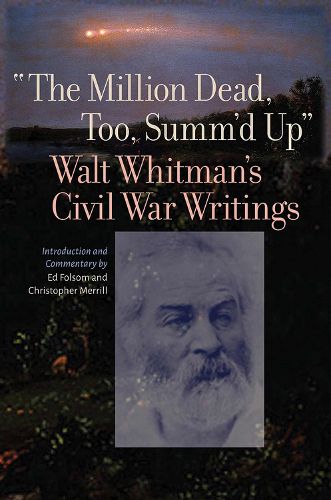Readings Newsletter
Become a Readings Member to make your shopping experience even easier.
Sign in or sign up for free!
You’re not far away from qualifying for FREE standard shipping within Australia
You’ve qualified for FREE standard shipping within Australia
The cart is loading…






This book is the first to offer a comprehensive selection of Walt Whitman’s Civil War poetry and prose with a full commentary on each work. Ed Folsom and Christopher Merrill carry on a dialogue with Whitman (and with each other) as they invite readers to trace how Whitman’s writing about the Civil War develops, shifts, and manifests itself in different genres throughout the years of the war. The book offers forty selections of Whitman’s war writings, including not only the well-known war poems but also his prose and personal letters. Each are followed by Folsom’s critical examination and then by Merrill’s afterword, suggesting broader contexts for thinking about the selection.
The real democratic reader, Whitman said, ‘must himself or herself construct indeed the poem, argument, history, metaphysical essay-the text furnishing the hints, the clue, the start or frame-work,’ because what is needed for democracy to flourish is ‘a nation of supple and athletic minds.’ Folsom and Merrill model this kind of active reading and encourage both seasoned and new readers of Whitman’s war writings to enter into the challenging and exhilarating mode of talking back to Whitman, arguing with him, and learning from him.
$9.00 standard shipping within Australia
FREE standard shipping within Australia for orders over $100.00
Express & International shipping calculated at checkout
This book is the first to offer a comprehensive selection of Walt Whitman’s Civil War poetry and prose with a full commentary on each work. Ed Folsom and Christopher Merrill carry on a dialogue with Whitman (and with each other) as they invite readers to trace how Whitman’s writing about the Civil War develops, shifts, and manifests itself in different genres throughout the years of the war. The book offers forty selections of Whitman’s war writings, including not only the well-known war poems but also his prose and personal letters. Each are followed by Folsom’s critical examination and then by Merrill’s afterword, suggesting broader contexts for thinking about the selection.
The real democratic reader, Whitman said, ‘must himself or herself construct indeed the poem, argument, history, metaphysical essay-the text furnishing the hints, the clue, the start or frame-work,’ because what is needed for democracy to flourish is ‘a nation of supple and athletic minds.’ Folsom and Merrill model this kind of active reading and encourage both seasoned and new readers of Whitman’s war writings to enter into the challenging and exhilarating mode of talking back to Whitman, arguing with him, and learning from him.